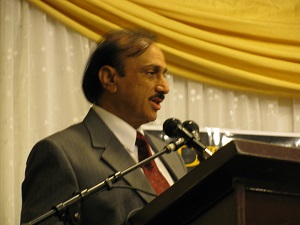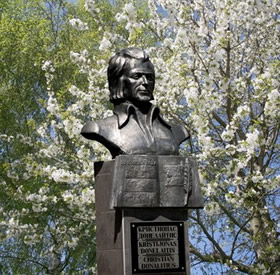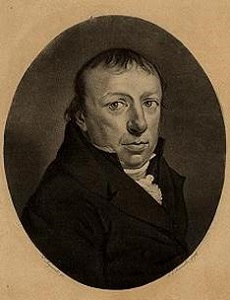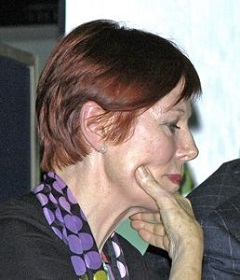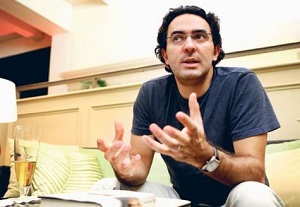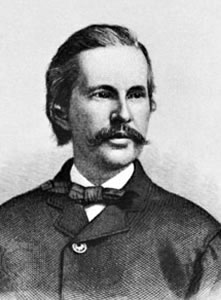De Nederlandse schrijfster Carry van Bruggen (eig. Caroline Lea de Haan) werd geboren in Smilde op 1 januari 1881. Zie ook alle tags voor Carry van Bruggen op dit blog.
Uit: Om de kinderen
“Mevrouw Van der Wal keek met een zwelling van trotsche vreugde in de borst naar het nieuwe toilet, dat Annie juist had neergespreid op de grijs-fluweelen rustbank in haar kleedkamer; het meisje, slank, in zwart japonnetje, wit schortje, hooggehakte schoentjes, stond op een afstand en wachtte bevelen – haar scherp, zelfbewust gezicht van jonge blondine, die zich bekoorlijk weet, drukte geen goedkeuring en geen afkeuring uit; de oogen hield ze bijna neergeslagen, als dicht, toch voelde de ander, dat ze de laag-uitgesneden, overrijk gegarneerde japon te jeugdig voor haar vond; dit onuitgesproken oordeel ergerde haar, meer nog ergerde haar de eigen ergernis er over, – met een kort woord zond ze Annie de kamer uit, tersluiks kijkend, of geen spottrekje iets van haar gevoelens verried – achter het meisje de deur onhoorbaar in het slot draaiend, kon ze zich nu op haar gemak overgeven aan het genot van het nieuwe ongerepte bezit, het kostbare toilet, waarin ze zich over enkele dagen aan een groot diner vertoonen zou.
De gedachte aan dat diner hield haar al de heele week in nerveuze spanning. Er kon zooveel van afhangen, want het zou haar eerste diner in de werkelijke groote wereld, in den moeilijk te betreden kring der echte aristocraten wezen. En het was aan Robert, haar oudsten zoon, haar trots, dat ze die uitnoodiging te danken hadden. Hij had den gastheer in het ouderlijk huis geintroduceerd. Bewonderenswaardig, zooals die jongen er slag van had de menschen te kiezen, met wie hij omgang wilde en dan, wat meer beduidde, van hen te verkrijgen, dat zij dan het eerst zijn omgang zochten. Ze voelde zoo goed wat het aan hem was.”
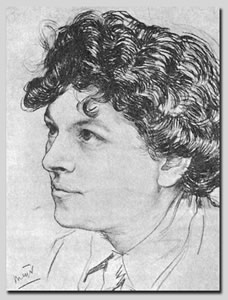
Carry van Bruggen (1 januari 1881 – 16 november 1932)
Portret door Annie de Meester
De Britse schrijver Joe Kingsley Orton werd geboren in Leicester op 1 januari 1933. Zie ook alle tags voor Joe Orten op dit blog.
Uit: Fred And Marge / The Visitors
“SPP: You seem to have a really worthwhile job here
Fred: We have our coats off, sir. Work is recognised as a virtue.
SPP: You push this stone –
Fred: Up the hill, sir.
SPP: And what happens then?
Fred: It all depends. It should roll down again. But accidents will happen. Sometimes it topples over the other side.”
(…)
“Kemp: I shall be here till they carry me out.
Mrs Platt: We’ll have you skipping about in no time.
Kemp: I won’t bother you much longer.
Mrs Platt: I won’t have that kind of talk, do you hear? You’ve got years ahead of you. What do you want to die for?
Kemp: I don’t want to.
Mrs Platt: Well?
Kemp: But I’m going to”.
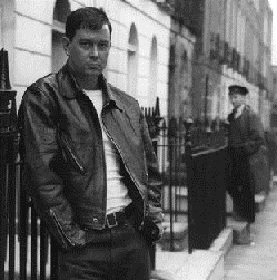
Joe Orton (1 januari 1933 – 9 augustus 1967)
De Mexicaanse schrijver en medicus Mariano Azuela González werd geboren in Lagos de Moreno op 1 januari 1873. Zie ook alle tags voor Mariano Azuela op dit blog.
Uit: Ceux d’en bas (Vertaald door Jeanne en Joaquin Maurin)
„Sur son cheval zain, Demetrio se sent rajeunir. Ses yeux recouvrent leur éclat métallique particulier, et sous ses joues cuivrées d’indigène de race pure coule à nouveau un sang rouge et ardent. Tous les hommes dilatent leurs poumons, comme pour respirer les vastes horizons, l’immensité du ciel, le bleu des montagnes et l’air frais, embaumé par les arômes de la sierra. Et ils font galoper leurs chevaux, comme s’ils voulaient, dans cette course effrénée, s’emparer de la terre entière.
(…)
C’était une véritable matinée nuptiale. Il avait plu la veille toute la soirée, le ciel se levait couvert de blanches nuées. Sur la cime de la sierra trottaient des poulains sauvages aux hautes crinières, gracieux, élégants comme les pics qui dressent leurs têtes jusqu’à embrasser les nuages.”
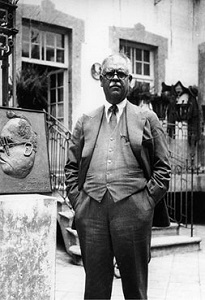
Mariano Azuela (1 januari 1873 – 1 maart 1952)
De Franse schrijver, essayist en vertaler René de Ceccatty werd geboren op 1 januari 1952 in Tunis. Zie ook alle tags voor René de Ceccatty op dit blog.
Uit: Raphaël et Raphaël
“Mais, en évoquant ce chemin que j’ai accompli sous cette sorte de galerie miroitante de feuilles par instants traversées de lumière, puis plongées dans l’ombre chaude, étouffante des après-midi du coeur mourant de l’été méridional, je constate que cet épisode que je décris minutieusement appartient déjà à ce passé d’où j’aurais voulu extraire la réminiscence qui l’aurait alourdi de sensations riches, frémissantes de cette vie restituée par la mémoire involontaire. Or je mentirais en prétendant qu’en marchant après l’ondée, mon parapluie embarrassant une de mes mains que j’aurais voulue libre comme l’autre, j’éprouvais la moindre émotion provenant du passé : j’étais trop décidé à visiter mon enfance pour qu’elle me fasse le cadeau d’une visite inopinée, elle-même.
M’aurait-on observé en train d’avancer sous la voûte feuillue, le long de ces façades autrefois bourgeoises et maintenant si négligées qu’elles pouvaient, derrière les volets écaillés et les fers forgés rouilles des balcons, sous la croûte tavelée des vieux crépis, paraître cacher des occupations abusives d’appartements abandonnés ou oubliés par leurs propriétaires, toute une population de locataires intrusifs, dans une accumulation de meubles récupérés, volés, sales, inutiles, inutilisables – un cauchemar de la pauvreté et de ses solutions de fortune -, on m’aurait cru dépourvu de la moindre incertitude sur ma destination, sur mes intentions.”
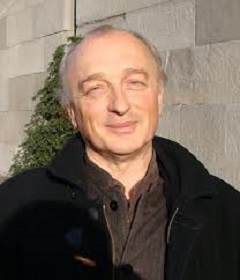
René de Ceccatty (Tunis, 1 januari 1952)
De Duitse schrijver en musicus Sven Regener werd geboren op 1 januari 1961 in Bremen. Zie alle tags voor Sven Regener op dit blog.
Uit: Der Hund
„Der Mensch ist ein Wesen mit freiem Willen, dachte Herr Lehmann, als er sich der anderen Seite des Lausitzer Platzes näherte, jeder muß selber wissen, was er tut und was nicht, und nur weil Erwin ein Depp ist und einen zum Schnapstrinken überredet, heißt das noch lange nicht, daß Erwin schuld ist, dachte er, aber er dachte auch mit Genugtuung an die Flasche Whisky, die er heimlich hatte mitgehen lassen und die in der großen Innentasche seines langen, für einen Septembertag im Grunde viel zu warmen Mantels steckte. Er selbst hatte zwar keine Verwendung für Whisky, denn er trank ja im Prinzip schon lange keinen Schnaps mehr, aber Erwin mußte immer mal wieder bestraft werden, und Herr Lehmann konnte die Flasche zur Not seinem besten Freund Karl schenken.
Dann sah er den Hund. Herr Lehmann, wie sie ihn neuerdings nannten, obwohl die, die das taten, auch nicht viel jünger waren, obwohl tatsächlich einige von ihnen, sein bester Freund Karl und auch Erwin zum Beispiel, sogar älter waren als er, kannte sich mit Hunderassen nicht aus, aber er konnte sich beim besten Willen nicht vorstellen, daß man so ein Tier mit Absicht züchtete. Der Hund hatte einen großen Kopf mit einer mächtigen, sabbernden Schnauze und zwei großen, lappigen Ohren, die links und rechts davon herunterhingen wie zwei welke Salatblätter. Sein Rumpf war fett, und sein Rücken so breit, daß man darauf eine Flasche Whisky hätte abstellen können, seine Beine waren dagegen unverhältnismäßig dünn, sie ragten aus dem Körper heraus wie abgebrochene Bleistifte. Herr Lehmann, der es nicht übermäßig witzig fand, daß man ihn jetzt so nannte, hatte noch nie ein so häßliches Tier gesehen. Er erschrak und blieb stehen. Er traute Hunden nicht. Und der Hund knurrte ihn an.

Sven Regener (Bremen, 1 januari 1961)
Zie voor nog meer schrijvers ook mijn vorige blog van vandaag.

